Using the eval command and functions
The eval command is intended to override values in fields. Can use mathematical operations, string concatenation, comparison expressions, Boolean expressions, functions.
eval uses data types:
StringNumericBooleansNull
The eval command requires that the field values correspond to the operation type and seeks to preserve the original data type in the resulting value. For example, with the exception of addition, arithmetic operations may not produce valid results if the values are not numeric. When concatenating values with a dot ., the eval command defines both values as String, regardless of their actual type.
The eval command can work with conditional operators.
In the if and case constructs in the body of the condition, you can use comparison functions (in, like, isnull, isnotnull, etc.) and simple logical expressions.
String concatenation
The request will create a new agentInf field using the pattern agent.type + - + agent.version.
source wineventlog-*
| eval agentInf=agent.type + " - " + agent.version
| table agentInf, agent.type, agent.version

Creating a new field from a service field
The query will output several fields in a table and a new field Index ID. The value of the Index name field will be assigned from the index service field.
source windows_events
| table destination.address, destination.ip, source.ip, event.action
| eval index_name = _index
| rename destination.address as "Target server address", destination.ip as "Target server IP", source.ip as "Source IP", event.action as "Event", index_name as "Index ID"
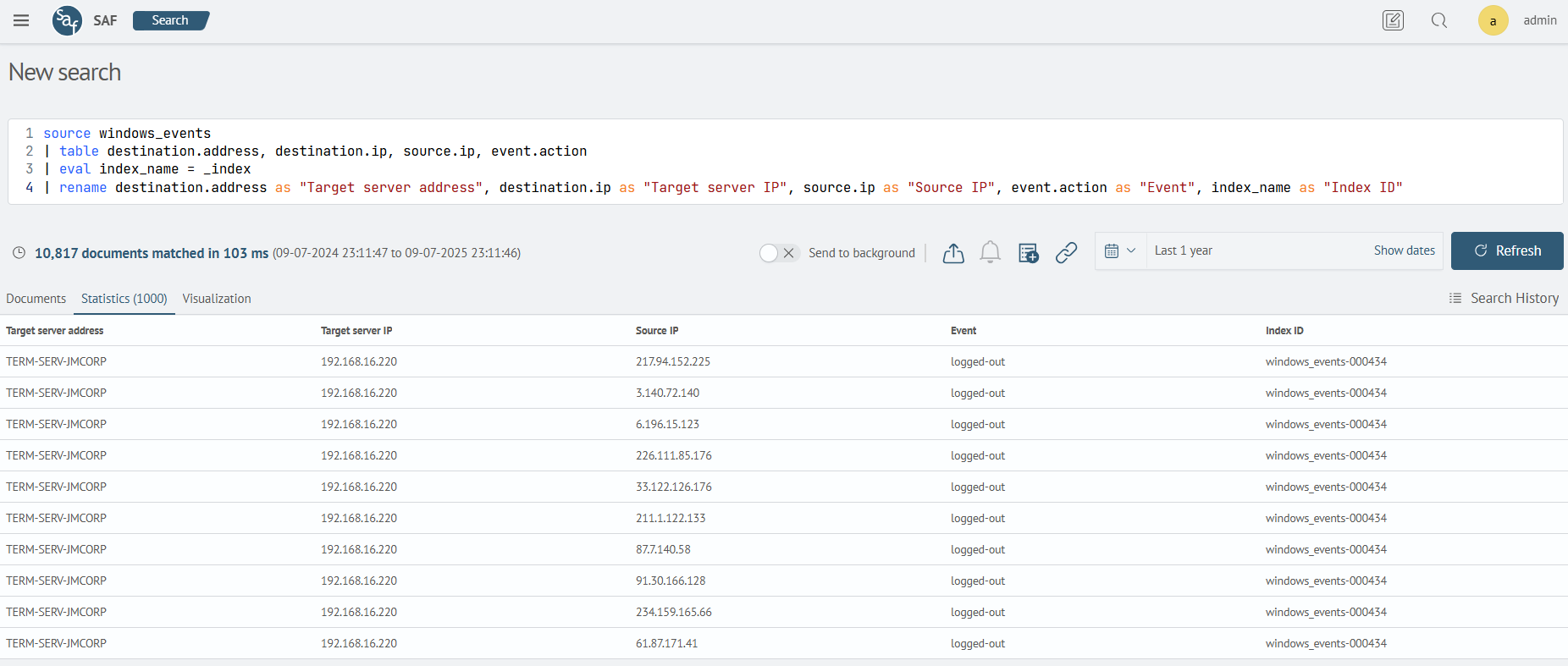
Using conditional statements if, case
This example uses an if statement. The outcome field can take two values: success and failure. The eval command will create a new result field and write a value to it if the outcome field value is success, otherwise the outcome field will be set to failure.
source wineventlog-*
| table outcome, result
| eval result = if(outcome == "success", "All is cool!", "Alarm!")
| rename outcome as "Outcome", result as "Result"
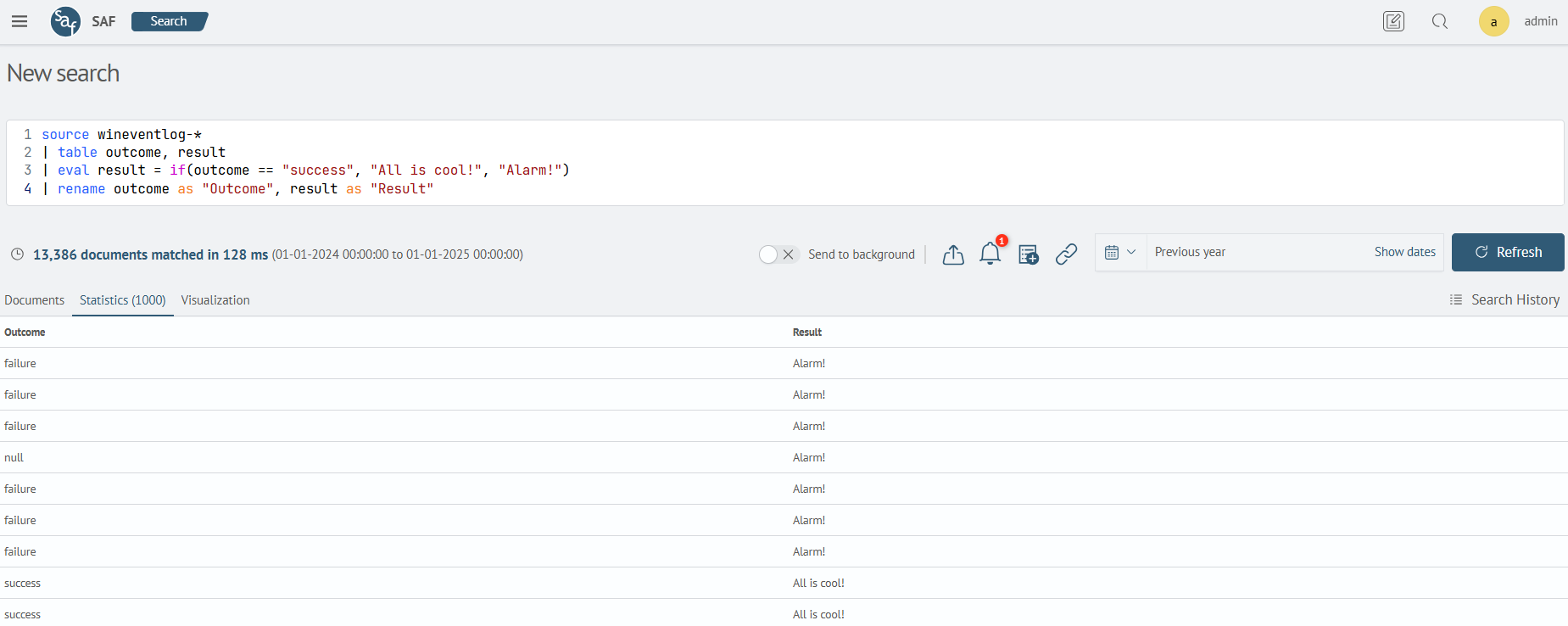
This example uses the search command to limit the search to three event.action field values (logged-out, logged-in, logon-failed), then the case command will compare these three values with the specified parameters.
source wineventlog-*
| search event.action.keyword="logged-out" OR event.action.keyword="logged-in" OR event.action.keyword="logon-failed"
| table destination.ip, source.ip, event.action
| eval result=case(event.action == "logged-out", "EXIT", event.action == "logged-in", "IN", event.action == "logon-failed", "Alarm!")
| rename destination.ip as "IP destination", source.ip as "IP source", event.action as "Action", result as "Result"
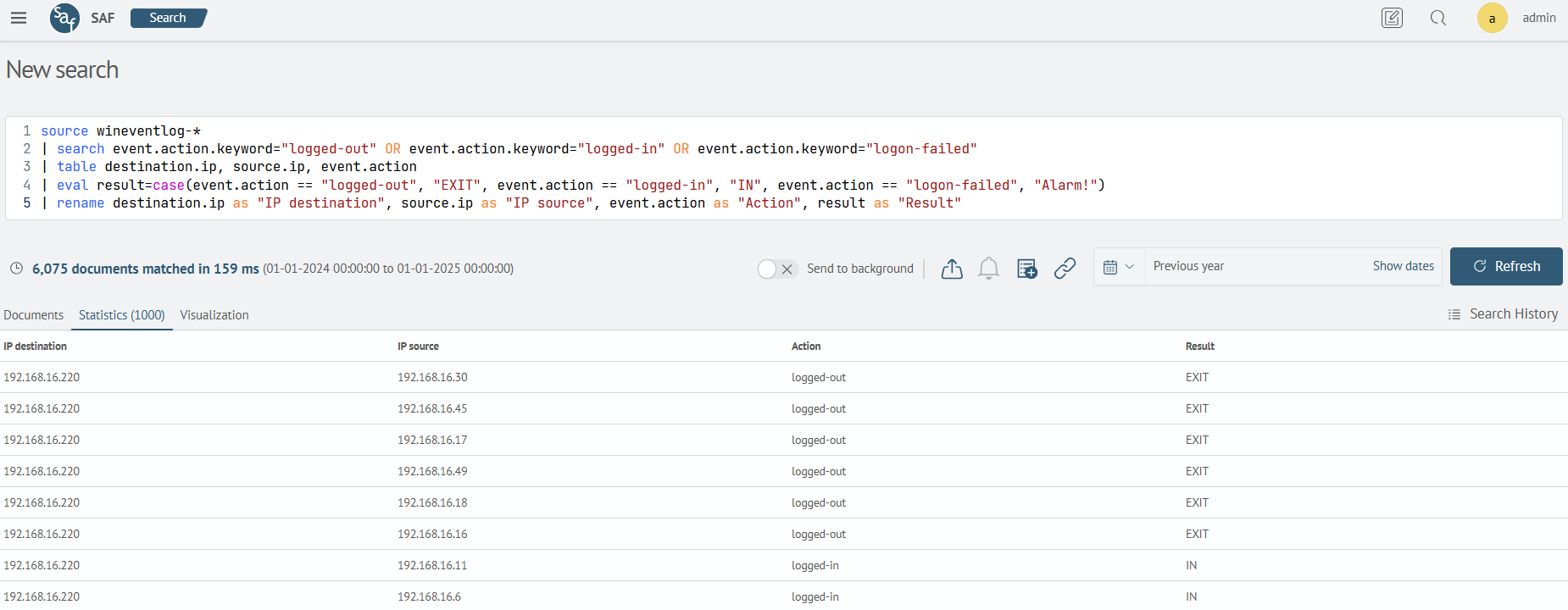
Using boolean expressions
This example uses the search command to limit the search to three event.action field values (logged-out, logged-in, logged-in-special), then, a combination of the if conditional statement and the logical expression or is used to compare the values of the event.action field.
source wineventlog-*
| search event.action.keyword="logged-out" OR event.action.keyword="logged-in" OR event.action.keyword="logged-in-special"
| table destination.ip, source.ip, event.action
| eval result = if(event.action=="logged-in" OR event.action == "logged-in-special" , "Authorization completed", "Session ended")
| rename destination.ip as "IP destination", source.ip as "IP source", event.action as "Action", result as "Result"
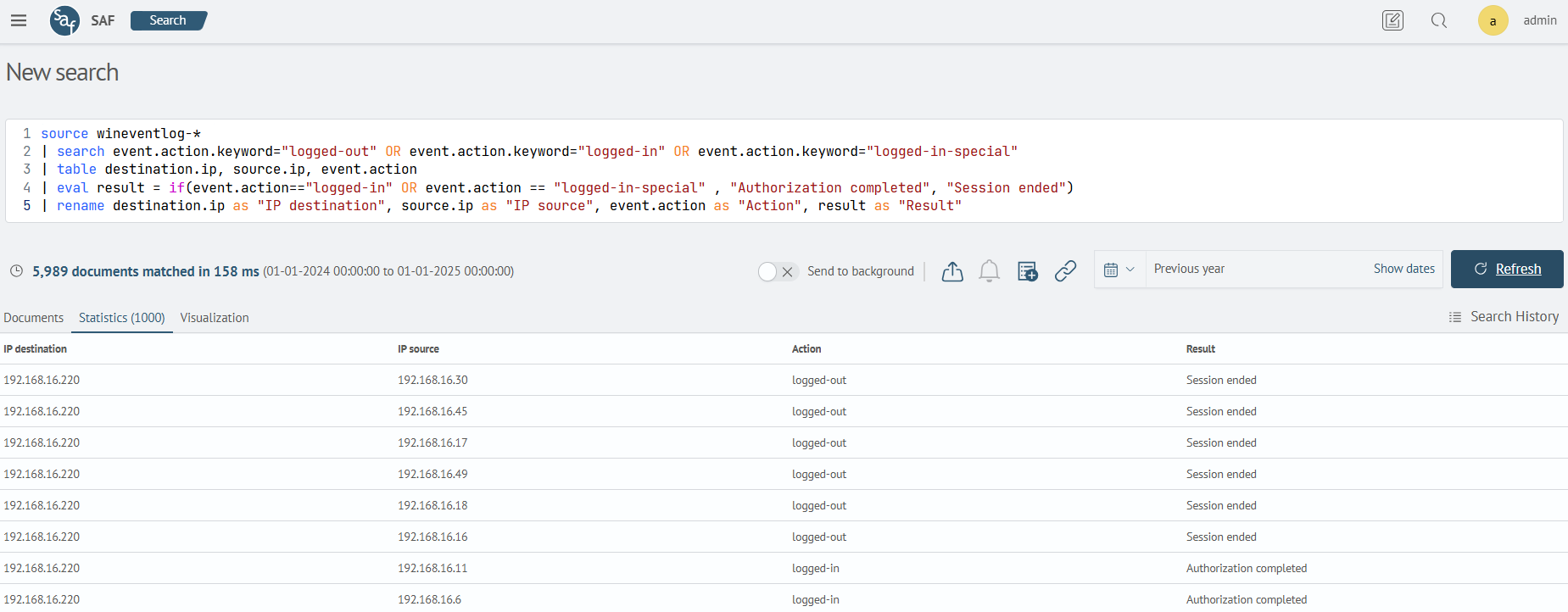
Using the like command
This example uses the search command to limit the search to three event.action field values (logged-out, logged-in, logged-in-special, logon-failed), then the value of the first argument is checked to match the pattern specified in the second argument. If the value of the event.action field matches the %logged% pattern, the result field is assigned the value All is cool!, otherwise Alarm! Logon Failed!.
source wineventlog-*
| search event.action.keyword="logged-out" OR event.action.keyword="logged-in" OR event.action.keyword="logged-in-special" OR event.action.keyword="logon-failed"
| table destination.ip, source.ip, event.action
| eval result = if(like(event.action,"%logged%"), "All is cool!", "Alarm! Logon Failed!")
| rename destination.ip as "IP destination", source.ip as "IP source", event.action as "Action", result as "Result"

Mathematical and statistical operations
This example will show the total cost of the order for each user.
source food_orders
| stats latest(total_price) as "total_price_USD" by user_id
| rename user_id as " User ID"

This example will convert the field total_price_USD to total_price_eur (will convert the price from usd to eur), and with the help of the round command, round it to two decimal places.
source food_orders
| stats latest(total_price) as total_price_usd by user_id
| eval total_price_eur = round((total_price_usd * 1.09),2)
| table total_price_usd, total_price_eur, user_id
| rename total_price_usd as "Final price USD", total_price_eur as "Final price EUR", user_id as "User ID"
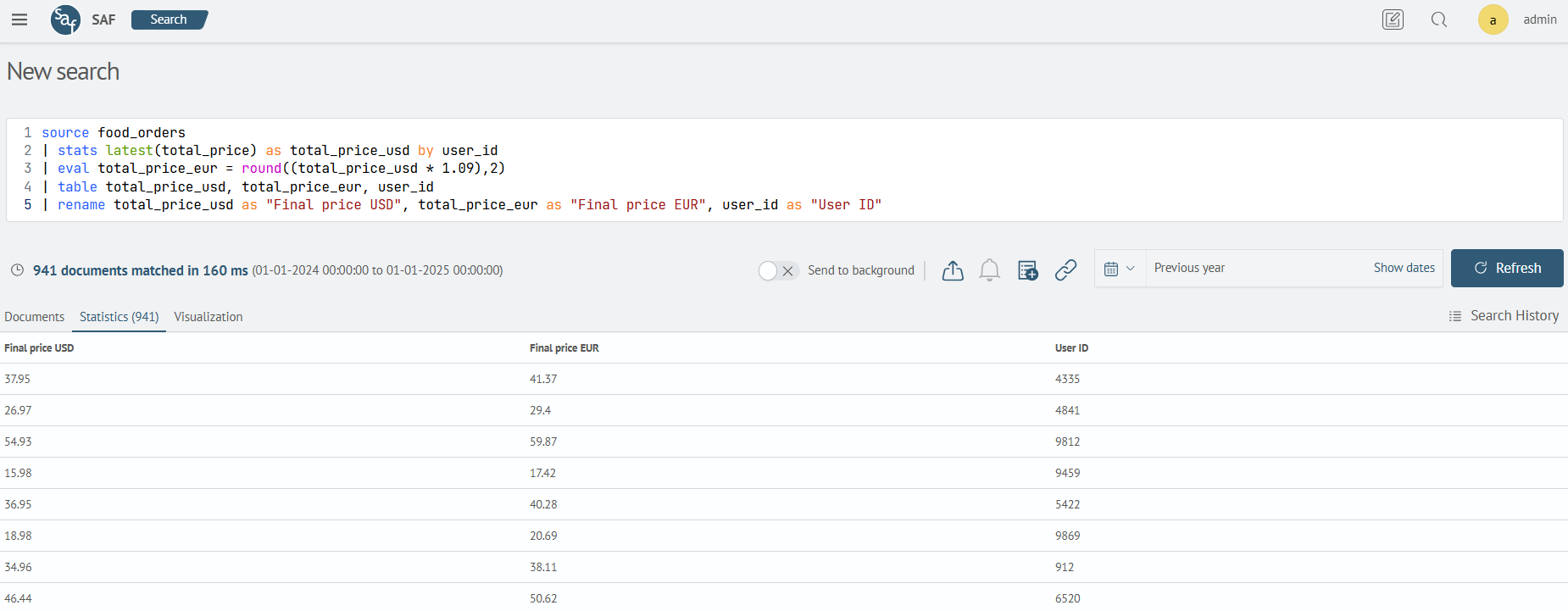
Working with text values
This example uses the where command to select messages where the host.name field contains any value, then use the lower command to convert the value of the host.name field to lower case. Note that if eval uses an already existing field name (hhost.name), then the field values will be replaced.
source wineventlog-*
| where isnotnull(host.name)
| table source.ip, host.name
| eval host.name_origin = host.name, host.name = lower(host.name)
| rename host.name_origin as "field host.name before upper command", host.name as "host name", source.ip as "source IP"
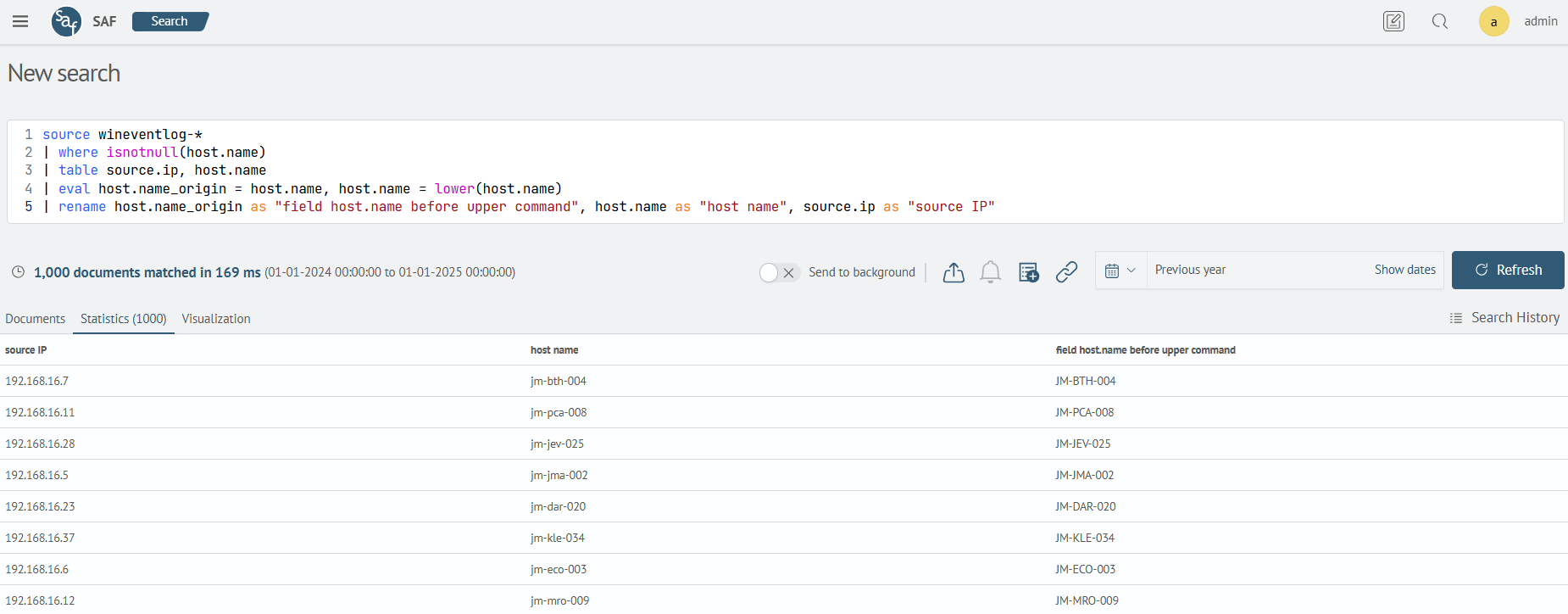
The trim command allows you to remove a substring from a field value in accordance with a pattern. In this example, the value of the host.name field will be converted - the substring will be removed according to the pattern JM-
source wineventlog-*
| where isnotnull(host.name)
| table source.ip, host.name
| eval host.name_origin=host.name, host.name=trim(host.name, "JM-")
| rename host.name_origin as "field host.name before trim command", host.name as "host name", source.ip as "source IP"
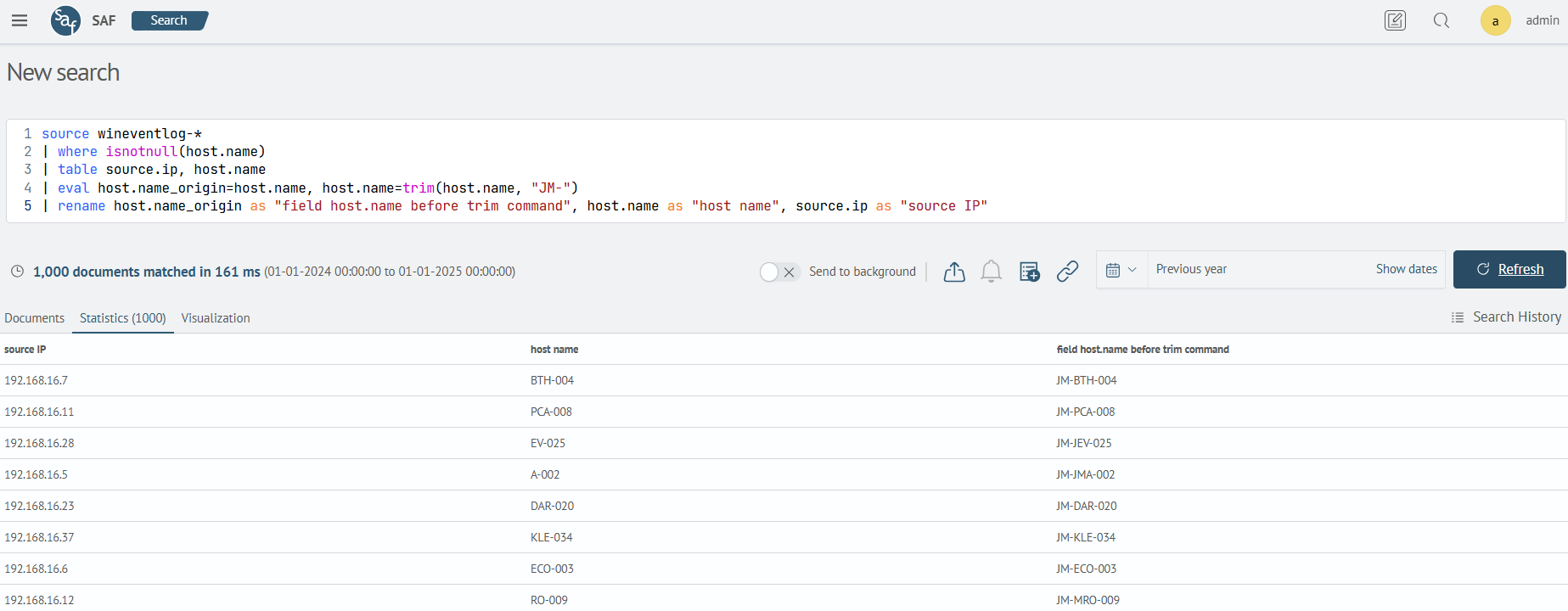
The replace command will replace the value of the destination.address field with the second and third found groups in the regular expression, that is, with the text after the first -.
source wineventlog-*
| table user.name, destination.address
| eval destination.address_replace = replace(destination.address, "(\w+)\-(\w+)\-(\w+)", "$2-$3")
| rename destination.address as "Field destination.address before replace command", destination.address_replace as "Destination address",user.name as "User name"